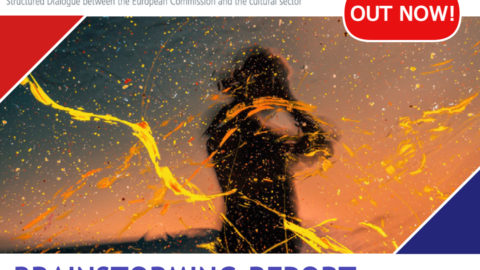“Status and working conditions of artists and cultural and creative professionals” has been the fourth topic of the Voices of Culture structured dialogue forum between Europe’s cultural ecosystem and the European Commission. 47 organisations, including Culture Action Europe, took part in the exercise. As a result of this dialogue the brainstorming report has been published, drafted on the basis of the two-day brainstorming session among cultural stakeholders active both on European and national levels on 27-28 April 2021.
In the report, three main areas have been highlighted: firstly, the income for artists and cultural and creative professionals and the status of the artist. The report illustrates ways and means for securing a fair income and strengthening social security in the sector as well as recognising the role and the legal status of the artists across Member States. The second topic of the report concerns mobility of artists and other cultural and creative workers. Based on available individual mobility schemes’ calls and the participants’ experience with different hybrid formats and blended mobility (such as iPortunus andErasmus+) re-thinking mobility has also been discussed in the light of the COVID-19 crisis and climate change. A set of recommendations on how cultural mobility can be made more sustainable has been included at the end of the chapter.
Lastly, the report also navigates artistic freedom and freedom of expression. Specifically, it explores developments and challenges to artistic freedom, offering a general overview of its state, as well as providing recommendations on how public interventions should protect and promote artistic freedom through measure and regulation at European, national and local levels. On this topic, Culture Action Europe’s recently published paper on artistic freedom highlights that protecting artistic freedom is a European value.
An important part of the report focuses also on what is needed to achieve a European framework for working conditions in the cultural and creative sectors and industries at the EU level, as called for by the European Parliament and other stakeholders. However, in order to achieve this goal, a broader reflection beyond the strict domain of culture is needed. “Since the European Union has only limited competences in the area of culture, the main challenge is to find the terrains in which the EU can act to improve working conditions in the CCSs. Firstly, there is a need to treat this matter as a social policy issue, by involving the sectoral social partners and relevant ministries responsible for economic development, labour and fiscal policies” reads the report.
Within the working-group that investigates this topic, Culture Action Europe has actively contributed to the discussion also by putting forward the key findings of its background analysis – realised at the request of the CULT Committee of the European Parliament and in collaboration with the independent researcher Mafalda Dâmaso. The topic is high in the strategic agenda of Culture Action Europe also for the upcoming three-year period, especially in light of the pandemic that has accelerated already existing and worrying trends and exacerbated the precarious features of the cultural and artistic work.
